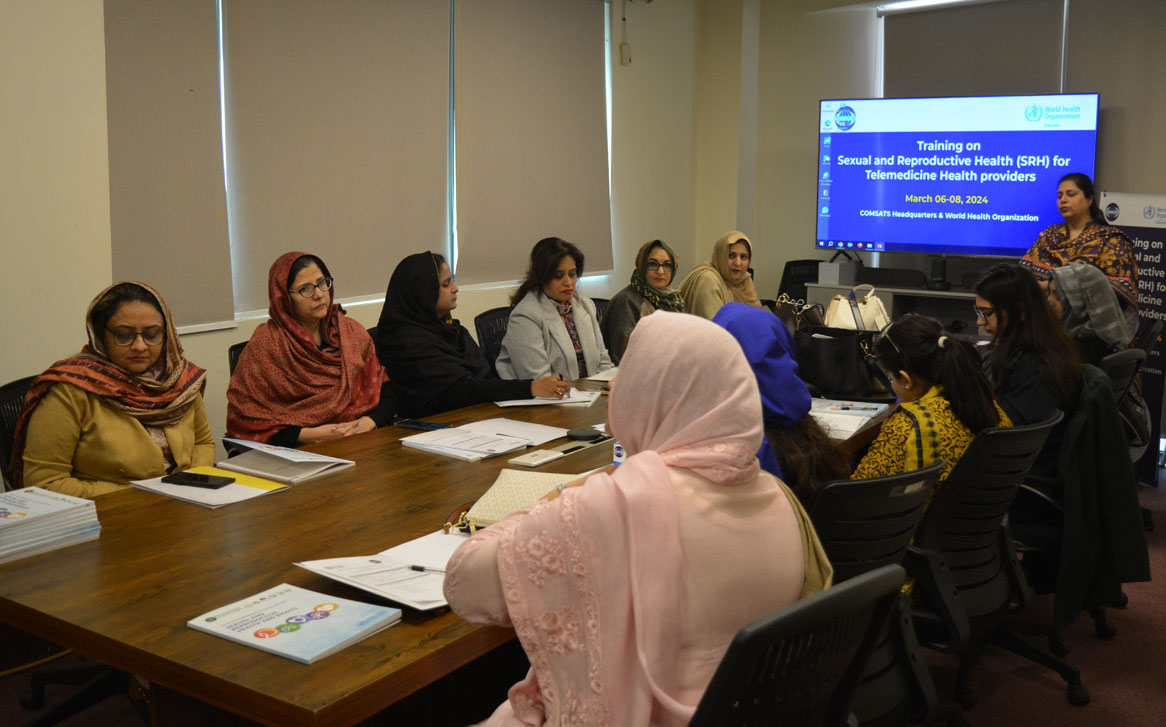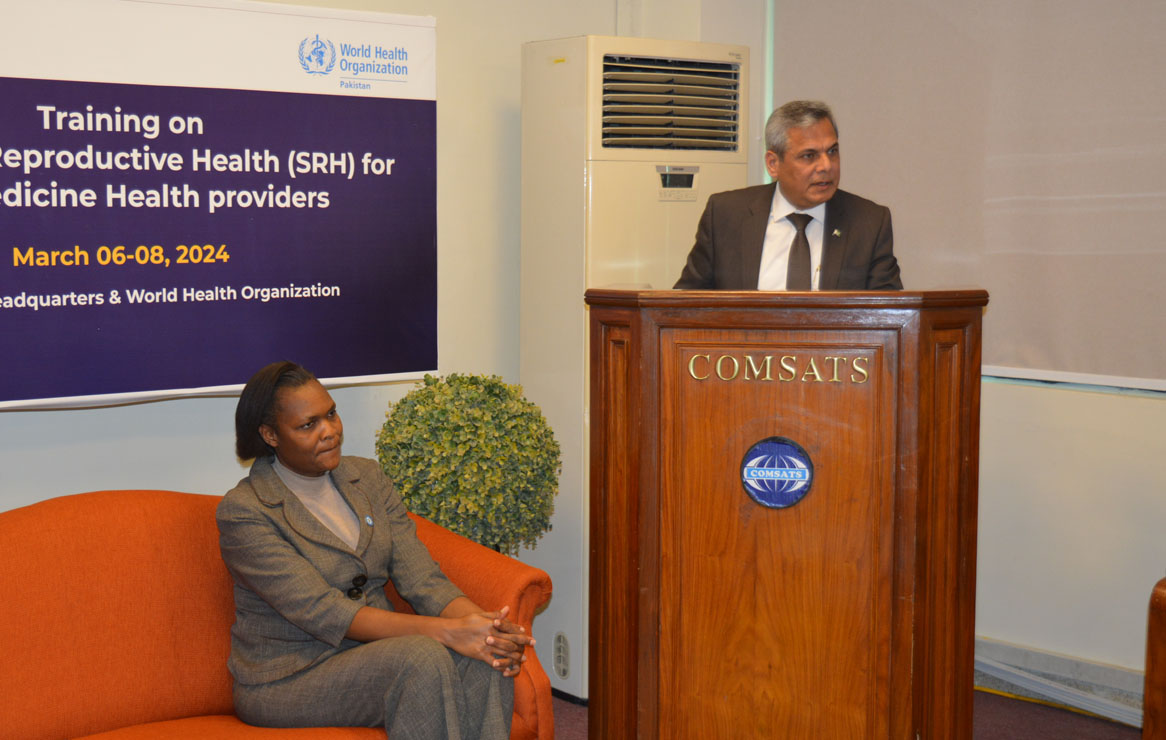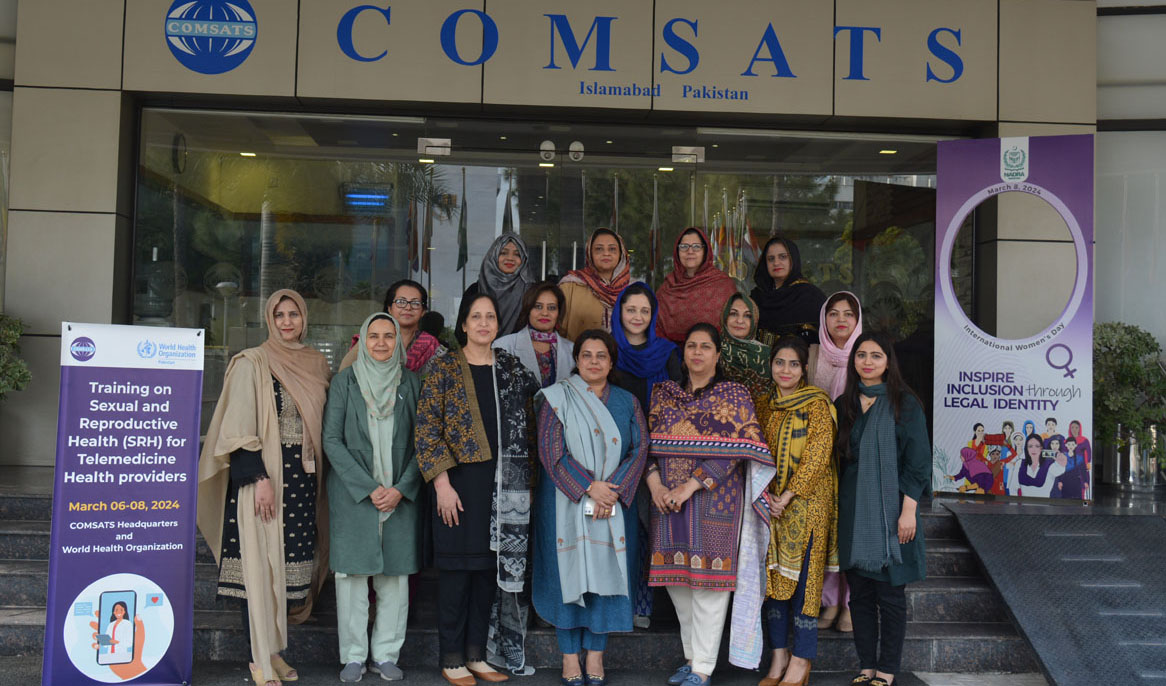A refresher training on Sexual and Reproductive Health (SRH) for telemedicine providers was organized by COMSATS, in collaboration with WHO Pakistan, for the doctors working at COMSATS Telehealth resource Centre. A similar training was organized by COMSATS and WHO in 2020 to support the Telemedicine providers of three organizations including COMSATS. This time, 15 doctors from COMSATS Telehealth Resource Centre attending the training workshops that spanned over a period of 3 days.
The aim of the training was to support the family physicians/general physicians at COMSATS Telehealth, in achieving personalized learning goals in Sexual reproductive health that are aligned with latest WHO guidelines and Telehealth practices.

The training initiated with brief introductions of the speakers and the participants followed by short pre-training assessment of the participants. The focal person of WHO Pakistan, Dr Sayema Awais shared the status of SRH in Pakistan and gave overview of national comprehensive Guidelines on the topic in Pakistan and also distributed its copies among the participants. She informed the participants that the core content of the guidelines include preconception care, antenatal, intra- natal and postnatal care, along with family planning and selfcare sections.
Elaborating on the topic of antenatal care, Speaker Dr Samina Naeem, consultant Gynaecologist emphasized that antenatal care aims to provide a women integrated care throughout pregnancy with the aim to reduce complications and timely referrals to avoid perinatal deaths. Dr Samina explained the important aspects of antenatal care e.g maternal and fetal assessment, nutritional evaluation and physiological symptoms worth paying attentions through examples during her own experience. The Antenatal care was followed by presentations on Routine Care in labour and delivery emphasizing on the timing and the need of referral.
On the second day the speakers specifically highlighted postpartum care, family planning and mental health disorders related to SRH. Dr Nabia Tariq, Consultant Gynaecologist & Director Academics Maroof International Hospital Islamabad discussed various family planning methods, their pros and cons through activity based interactive and collaborative learning approach. She specifically emphasized on the counselling techniques that is the most difficult step in contraception.
Dr Maimoona Saadi, the technical officer, Mental Health, WHO gave insights inti the mental health issues related to SRH, especially postpartum depression(PPD).She shared with the participants that every 1 in 10 patients suffer from PPD that makes it necessary for the primary care providers to differentiate the PPD with baby blues through symptoms and know the counselling and educative measures for treatment.
The last speaker for the day was Dr Ayesha Babar, Al-Shifa School of Public Health who appraised the participants of the importance of the postpartum as 2/3rds of the apprx 500,000 women that die every year due to pregnancy-related complications, are in the postpartum period. She elaborated on the timings of the discharge of the patients from hospital and discussed in detail the signs and symptoms to look for on follow-up visits at third day, 7-14 day and at six weeks.
Dr Ayesha Babar covered the postpartum care in two phases. Phase one was presented on day two of the training while the rest of the presentation was completed on the last and final day. On the last day she also discussed the new born care with the participants. She provided detailed insight on the routine checkups, red-flags and abnormal signs to look for in the new born.
Dr Sayema Awais, shared the self-care interventions with the participants that may help the trained physicians for their personal care and can be passed on to the patients when needed. Other than the topics discussed during the previous days, she focused on the Sexually transmitted diseases, new recommendations on self-screening with ovulation predictor kits (OPKs) for fertility regulation, family planning and elimination of unsafe abortion through self-care. The last presentation of the day was abortion care presented by Dr Samina Naeem, who elaborated on the complications of unsafe abortion, how to recognize the danger signs and appropriate treatment accordingly. She also explained the relevant laws within Pakistan and the circumstances where it is allowed.
Closing session of the training was held on the third day. Amb Dr Muhammad Nafees Zakaria, Executive Director COMSATS was the chief guest of the ceremony. Dr Ellen Thom, Team lead MNCH, WHO, also attended the session on the behalf of her organization. In her introductory remarks Dr Sayema Awais recapped the three days of training workshop followed by the vote of thanks presented by Dr Azeema Fareed, Additional Director (Health) and Incharge Telehealth, COMSATS. She expressed gratitude on behalf of the COMSATS to the partner organization WHO and the worthy speakers for the support that made the three day workshop possible. Talking on the occasion, Ms. Ellen Thom referred to the previous workshop conducted back in 2020 and expressed her pleasure to be part of the training “as coming back home”. She stated how Telemedicine was a new thing back then however it has become a norm since COVID. She also pledged to continue collaboration with COMSATS in future.

Speaking on the occasion, the Executive Director COMSATS expressed his hope that the skills and knowledge received by the Telehealth physicians during the workshop will in turn benefit their patients who hail from the areas that are hard to reach to healthcare. He highlighted the workshop as symbol of the COMSATS’ commitment to leveraging technology for better healthcare and enhancing its effectiveness through capacity building of the providers. He appreciated the dedication of the doctors working at Telehealth and lectured that the responsibility you shoulder today extends far beyond the confines of this workshop i.e to the communities that you serve.
The closing ceremony was followed by cake cutting ceremony, celebrated in the context of International Women’s Day that coincided with the last day of the training.

In summary, the training provided a quick refresher for the physicians working with COMSATS Telehealth elaborating on many new guidelines and aspects that might have been different when the doctors last received any formal training.





